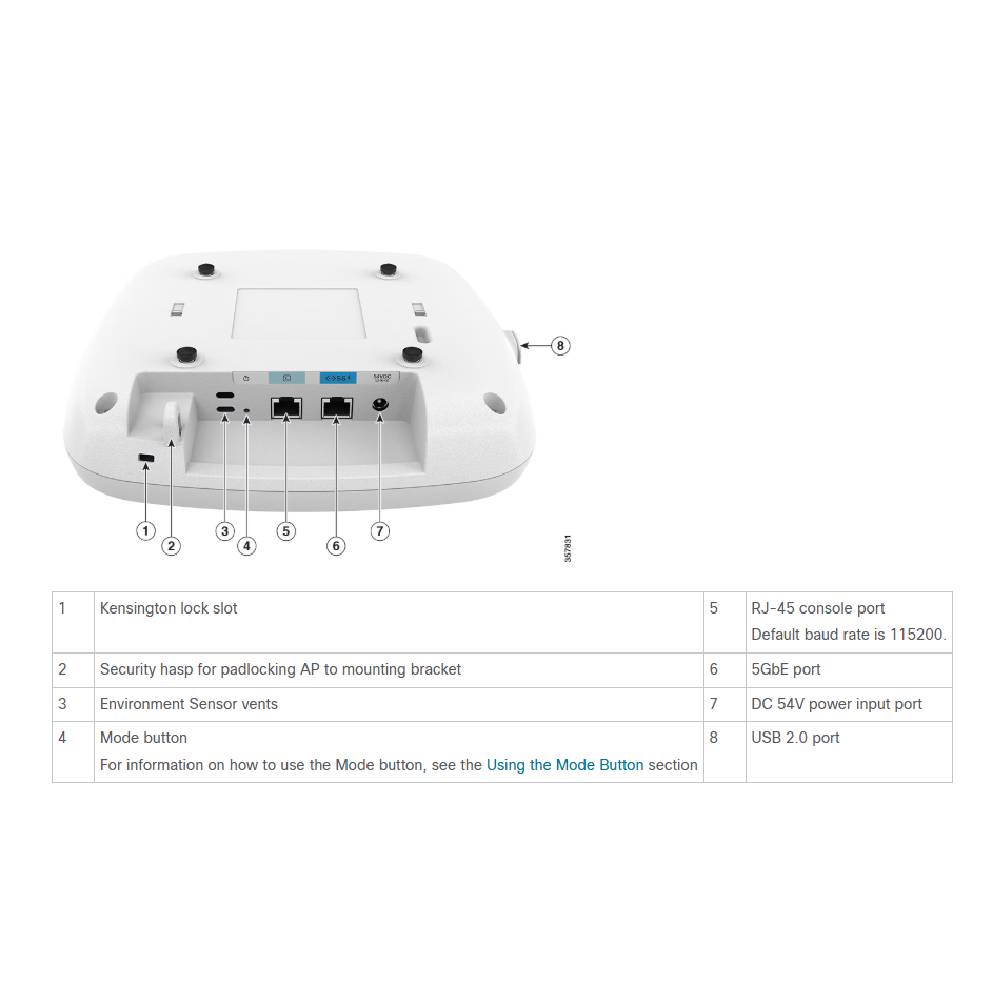1-2 DAYS UK DELIVERY | VOLUME DISCOUNTS | FINANCIAL SERVICES | OUR BLOG
All Categories
CW9166I-ROW | Cisco Catalyst Wi-Fi 6E Indoor Access Point
£1,051.98 inc VAT
CW9166I-ROW
Availability:
Couldn't load pickup availability
The Cisco catalyst CW9166I-ROW is a Wi-Fi 6E(802.11ax)indoor access point. Five radios: 2.4 GHz (4x4), 5 GHz (4x4), 6 GHz (4x4), IoT radio & band steering radio
Key Features
- Wi-Fi 6 and Wi-Fi 6E (802.11ax): The IEEE 802.11ax standard, also known as High-Efficiency Wireless (HEW) or Wi-Fi 6, builds on 802.11ac. It delivers a better experience in typical environments with more predictable performance for advanced applications such as 4K or 8K video; high-density, high-definition collaboration apps; all-wireless offices; and the Internet of Things (IoT). Wi-Fi 6E is Wi-Fi 6 “extended” into the 6-GHz frequency band
- XOR radio: The dual-band XOR radio in the Catalyst 9166 Series enables shifting capacity between 6 GHz and a secondary 5-GHz radio.
- Environmental sensors: These built-in sensors measure air quality (total volatile organic compounds [TVOC]), temperature, and humidity, and help ensure a safe working environment, avoiding the need to install an overlay of difficult-to-manage independent sensors.
- Zero Wait DFS: Allows for continuous monitoring of DFS channels for radar events thus enabling faster channel changes when needed. This enables RRM to minimize client distribution and maximize operational readiness.
- AP power optimizations (AP Power Save Mode): AP Power optimizations (AP Power save mode) allows the access point to reduce its power consumption by e.g. shutting off radios during off-hours and weekends – whilst still being smart enough to re-engage all features should they be needed. This both saves power and reduces the carbon footprint of running a wireless network.
- CleanAir™ Pro: CleanAir™ Pro extends Cisco’s industry leading RF Interference detection and classification into the 6 GHz band.
- Band steering: Enhanced to help clients that are 6-GHz capable to leave the 5-GHz radio and connect to the 6-GHz one. Wi-Fi 6E clients are automatically directed to connect to the 6-GHz radio to take advantage of the benefits it offers and free up the 2.4- and 5-GHz radios for legacy clients.
- Uplink/downlink OFDMA: Orthogonal Frequency-Division Multiple Access (OFDMA)-based scheduling splits the bandwidth into smaller frequency allocations called Resource Units (RUs), which can be assigned to individual clients in both the downlink and uplink directions to reduce overhead and latency.
- Uplink/downlink MU‑MIMO technology: Supporting the highest number with 12 spatial streams, multiuser multiple input, multiple output (MU-MIMO) enables the access points to split spatial streams between client devices to maximize throughput.
- BSS coloring: Spatial reuse (also known as Basic Service Set [BSS] coloring) allows the access points and their clients to differentiate between BSSs, thus permitting more simultaneous transmissions.
- Target Wake Time: Target Wake Time (TWT) allows the client to stay asleep and to wake up only at prescheduled (target) times to exchange data with the access point. This offers significant energy savings for battery-operated devices, up to three to four times the savings achieved by 802.11n and 802.11ac.
- Intelligent Capture: Intelligent Capture probes the network and provides Cisco DNA Center with deep analysis. The software can track more than 240 anomalies and instantaneously review all packets on demand, emulating the onsite network administrator. Intelligent Capture allows for more informed decisions on your wireless networks.
- Application hosting: Application hosting helps simplify IoT deployments and ready them for the future by eliminating the need to install and manage overlay networks. Using the USB interface, containerized applications and hardware modules can be deployed to reduce cost and complexity. Adding Cisco DNA Center provides workflows and deployment-wide application lifecycle management.
- Bluetooth 5.1: The integrated Bluetooth Low Energy (BLE) 5.1 radio enables location-based use cases such as asset tracking, wayfinding, and analytics.
- Container support for applications: Container support enables edge computing capabilities for IoT applications on the host access point.
-
Choice of persona: Cisco Catalyst 9166 Series Access Points can be managed either on-premises with Catalyst 9800 Wireless Lan Controllers (WLC) or cloud-managed through the Meraki dashboard. Customers have the flexibility to deploy these access points in one persona and shift to a different persona in the future.
Options
DNA Licences (Optional)
Downloads
Datasheet
About This Product
The Cisco Catalyst 9166 Series Access Points are advanced wireless solutions designed for mission-critical environments, offering the flexibility of both on-premises and cloud-based management. These next-generation access points support the 6 GHz band introduced with Wi-Fi 6E, delivering enhanced performance, security, and reliability.
With support for hybrid network management, the Catalyst 9166 Series helps safeguard your infrastructure investment while enabling seamless transitions between management modes. By leveraging the expanded 6 GHz spectrum, these access points offer higher throughput, greater capacity, and reduced interference—ideal for high-demand wireless environments. Each unit includes three 4x4 radios and a suite of advanced features to support modern connectivity needs.
By combining Cisco’s robust Catalyst platform with the intuitive Meraki cloud interface, the 9166 Series delivers a unified and powerful networking experience. It’s an excellent choice for organizations supporting hybrid workforces, offering secure, high-performance access from virtually anywhere.
One of the key advantages of the 9166 Series is its management flexibility. Organizations can start with an on-premises setup and later switch to cloud-based management—without needing to replace or redistribute hardware—making it a future-ready solution for evolving IT strategies.







